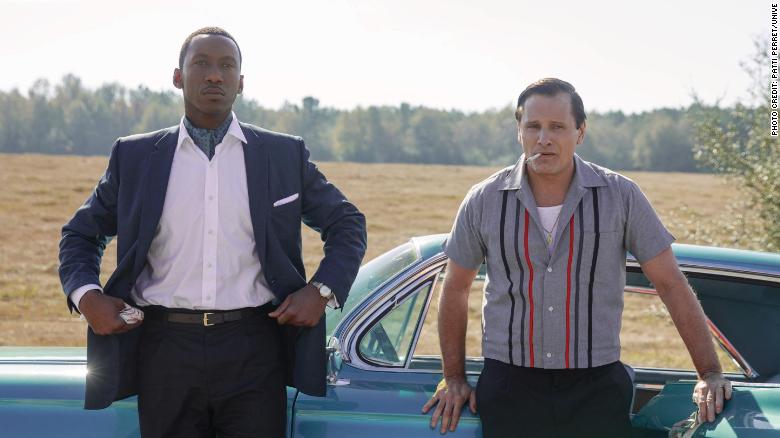This article originally appeared on VICE Canada.
Green Book is 2018’s Driving Miss Daisy, that much is clear.
I didn’t catch the theater run back in ‘89, in which Morgan Freeman takes on the role of Hoke Colburn—an aged chauffeur to white Jessica Tandy’s Miss Daisy. But I did catch the 1992 VHS release, where Freeman steers her—and himself—not just through her affairs in Atlanta, but through the droves of shifting race relations that always seemed offset, distant, and off-camera—like white art imitating white life.
Interestingly enough, it’s been a recurring theme for white audiences to treat racial confrontation in a certain way; as if they're a passenger. It’s natural, and it’s as automatic as it is instinctual to become Miss Daisys of their own—choosing the destination, where to turn, look, and go in retreat from actual injustices.
It’s what happens when I see the Miss Daisys of the world—minus black voices—articulating experiences like my own; coating everything with soft-edged, genteel themes for populaces deep in that post-racial fuckshit. Sitting by while watching audiences laugh, and take in the Green Book felt like another degree of condescension for the self-congratulatory, Trump-condemning, “colorblind” viewer who consumes their racism with a side of mayo. And speaking as a black viewer, I don’t have time for it.
Early on in Green Book we’re presented with a wishy-washy idea of intolerance in 1962 America: Think the standard racism and segregation that would have made a trip for a wealthy, educated black man in the deep south deadly. Within that mix, audiences meet Tony (Viggo Mortensen)—an Italian-American—so disgusted by blackness, that he can’t stand the idea of construction workers sharing his drinking glasses. But still, 20 minutes in, he’s agreeing to guard and drive a black pianist, Dr. Don Shirley (Mahershala Ali), down south without issue; because our racist white man must also be likable. And then there’s Dr. Don Shirley himself, the ever inconsistent Oreo—the derogatory term for a blackness that teeters toward whiteness—who comes off like a black-to-white “message” translator for the black experience.

On one hand, Tony is his gentle talk piece for an old-day ignorance, and on the other, Don is the answerable black man in a white gettup—respectable, pleasant, and approachable—who answers old-day ignorance to new-day audiences with internet connections who have no fucking reasons to be that ignorant. Every moment Don grabs his alter, and speaks about black folks not being a monolith, or confronting racism with an exposed cheek, blah blah blah (“dignity always wins”), forces everything within me to not roll my eyes back to the point of pain.
There’s been a considerable cost to this placating of white audiences whenever race becomes the topic of interest. I had issues with Spike Lee’s BlacKkKlansman for the very same reasons. In essence, it comes down to whose feelings are made most important. While movies like Green Book and BlacKkKlansman attempt to spotlight racism, but they do so by placing those feelings at the forefront of a conversation. They still twist themselves into worn narrative origamis; always trying to fold racism into friendships and cooperations between the oppressed (black people) and the privileged (white people). Every joke, laugh, or light touch within the context of all that becomes weakened through cartoonish characterizations: Racist cops in both Green Book and BlacKkKlansman are suddenly both the heroes and the villains. White supremacists are suddenly dumb and the unrelatable. And endings become the happy-ending conventions of the cherry and hippy. In the end, all they do is convey the less than obvious messages around black dependency and white paternalism; leaving folks with the feel of an allyship with minimal effort.
I say all this without ignorance to the record of Hollywood’s own self-congratulatory relationship with movies like this. BlacKkKlansman was the first Spike Lee joint in a while to receive critical praise and standing ovations by Hollywood’s most elite. The Help—that 8.1, IMDB rated black maid film—was Oscar nominated for the best motion picture in 2012. Hidden Figures—that film about black women at NASA with its own white savior problems—was Oscar nominated for best picture in 2017. Driving Miss Daisy won best picture in the same year of Spike Lee’s comparatively confrontational Do the Right Thing, which wasn’t even nominated, in 1990. And our very own Green Book won a People’s Choice Award at TIFF just this year.
This gentle, back-to-school trivialization of racism in order to downplay white guilt is not just symbolic of the normalization of the same, “innocent me” sort of racism that voted for Trump behind curtains, it’s also representative of the kind of racial conversation that an entire industry (some white reviewers included) is looking to elevate. Maybe white audiences can see progressiveness in that, but I can’t, don’t, and won’t.
Sign up for our newsletter to get the best of VICE delivered to your inbox daily.
Follow Noel Ransome on Twitter.
from VICE https://ift.tt/2QZFA9M
via cheap web hosting
No comments:
Post a Comment